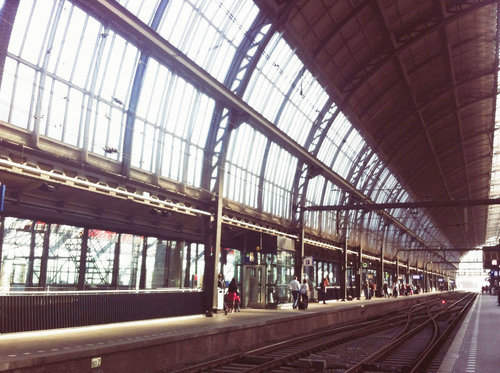Kate Inglis's Blog, page 9
April 29, 2015
flying high with MASC young authors + illustrators

It starts with an email out of nowhere that says something like Hello, would you come to Someplace Far Away to teach kids and the voice in my head barks SPAM and I always have to pause on the delete button because I don't always feel as lucky as an email like that would indicate. I'm usually here by the woodstove worrying about whatever's supposed to come next, feeling isolated by the country, and The Country, and the weather, and the boundaries of my brain. And then boom: HELLO.
I got on a plane and this time, I landed in the capital city of Canada for Ottawa's MASC Young Illustrators & Authors Conference. I drove past Parliament Hill, and threw a few rotten eggs out the window at Prime Minister Harper's house. I missed. I told author Tim Wynne-Jones to hit the gas, and we evaded the RCMP in a chase that ensued but only after our car flew over a cliff with an unfurled umbrella to save us, like Paddington Bear or Pee Wee Herman. In mid-air, somebody shouted THE AAARTS! and the sky exploded like a wall of paintball splooshes and when we landed, we were all a million colours.
Being around kids—especially 600 over three days—makes you tell tall tales. The taller, the better.

Unlike in Labrador, where artists were ferried around in tiny planes to Innu and Inuit outports, this event trucked students in by apparent dozens and we stayed put in perhaps the best workshop space I've ever seen—Ottawa's Canada Aviation & Space Museum. The moment I walked into the building, I saw a great black hulk staring me down from across the hangar and it was, indeed—as I'd recognized with a gasp—my grampa's plane.
It was the great British bomber, the legendary Lancaster, dwarfing the Messerschmitt and the Spitfire and everything else that sat parked in the lee of its wingspan. I'd never seen one before. We had the run of the place, so every morning on my way past Chris Hadfield's space suit down the hallway of astronauts to my workshop room, I'd tiptoe underneath the fuselage and press my palm to its belly or a tire or a bomb and whisper Hello, chums and I swear they whispered back.
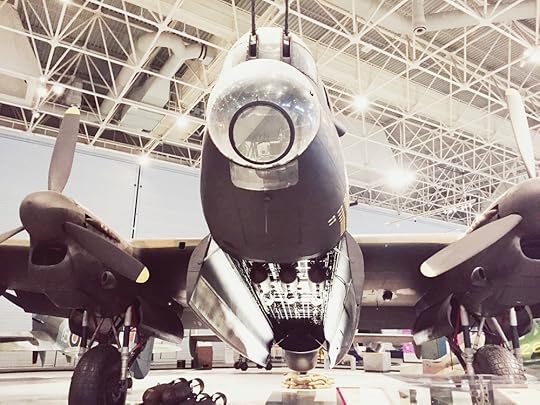

'Loaded, 1944.' From my grampa's photos over four tours of duty.


Being on such sacred ground—along with an ornithopter (a human-powered glider that flies like a bird, with flapping wings), a crashed turn-of-the-century bush plane, and the skeletons of the very first cloth-covered means of flight—was imagination food. Every day, I ordered the kids out onto the floor in search of stories.
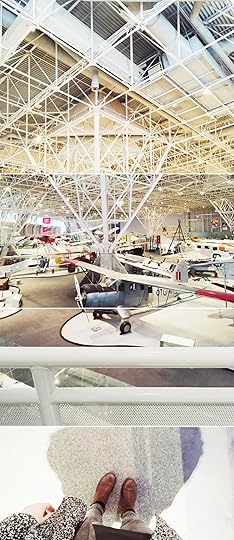
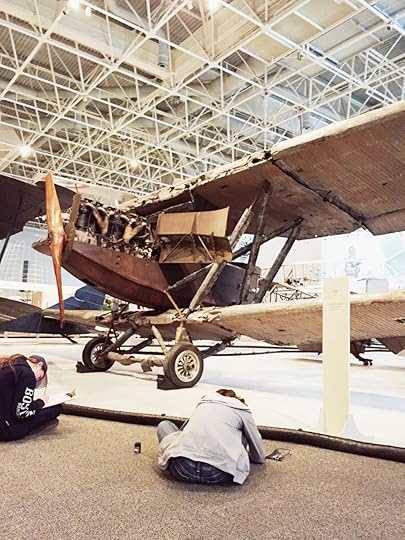

There were mechanical dragons and thieves. There was a German defector, a wolf pack, a storm. A girl crash-landed, her bush plane swallowed up into the deep muck of a lake, and she emerged when they found her fifty years later. She had grown gills and gone wild. They all stood up one by one and read out loud and I stood there with my hand over my mouth, smiling so big.
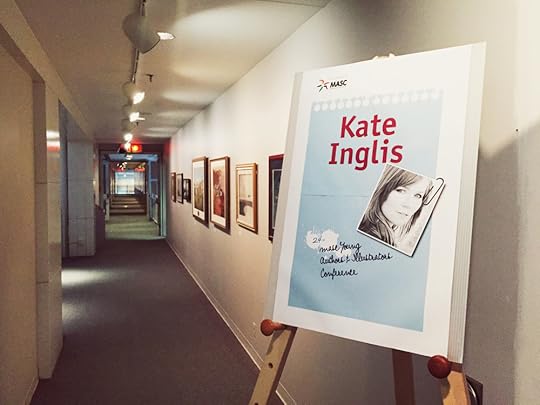


I gave them drills, too, because you've got to take those inspirations and make them tight and zingy and poppy.
Choose an emotion, I instructed. But don't tell us which one. Write a little scene—a character enters a room—and show us how they're feeling in the way they walk, in the verbs you choose, in their expression and unconscious quirks. Then you're going to read aloud, and we're going to guess. GO!
There were clenched fists and slammed doors and faces like the sun.


It can feel like all anybody cares about is money, I said. This is capitalism gone too far. And so sometimes, when you're artistic, and you stand up and say so, the world says: "Oh Yeah? Sure. Who do you think you are?"
I say it with a sneer and they all giggle but they know this is serious stuff. You've got to hold on to differentness like the precious gem that it is. I show Evan's split portrait and ask them to tell me who they think they are—first on the outside, in the usual way that people see. And then on the inside, in their imagination.
On the outside, I am a pretty regular kid, says one, reading in front of a wall-diorama of Neptune. But on the inside I am a hummingbird, putting out fires drop by drop.
We draw and write through life not only for sanity or play or escape, but because when you make space for art, you become a magnet for other people who make space for art. And people like that are weird and rare and fantastic. They do the best stuff. They throw wood onto our fires and they make the room warm. Oddity fuels oddity when everything else is beige.

Illustrators Sydney Smith and Matt James


Illustrator Geneviève Deprés; authors Catherine Austen, Tim Wynne-Jones, and Rina Singh; illustrator Matt James; author Monique Polak; me; and illustrator Sydney Smith at the MASC Young Authors & Illustrators Conference in Ottawa, Ontario. With many thanks to the countless volunteers, organizers, sponsors, and parents who made the most fantastic three days so fantastic for all of us kids.
April 27, 2015
post notes, two months later

I found these stream-of-consciousness notes from many weeks ago and it feels just right as it is. The winter is over! This unrelenting winter. I couldn't do much, like all of us in the Maritimes, other than either buy a plane ticket or batten down and wait for it to stop.
As I write this, three days from May, it's snowing again. But it won't stick. Like bigotry and heartbeats it knows it's doomed, falling on soft mud and new worms.
+++
The roads grunt and heave and the highway is lined like a tunnel of snowy white concrete that's taller than the car, and everyone's beaten up and slamming into potholes and bottoming out, and this winter: everyone's bottoming out.

I shovelled that roof three times, worried about collapse
The boys climbed up and needed no boost
I ran away to Cuba. There was a band.
Came home, watched the kids in the backseat, their eyes darting around. I hadn't seen them in too long. I almost ate them up. They demolish novels the same way they demolish pancakes. What do they think? What do they see? Will I ever stop wondering?
Ben drinks pina coladas now. He says Without Rum Please.
I will save money. I will run away again, except next time, with them.
It was the only way through.
February 13, 2015
Zombies, goblins, and a one-and-only Orchard
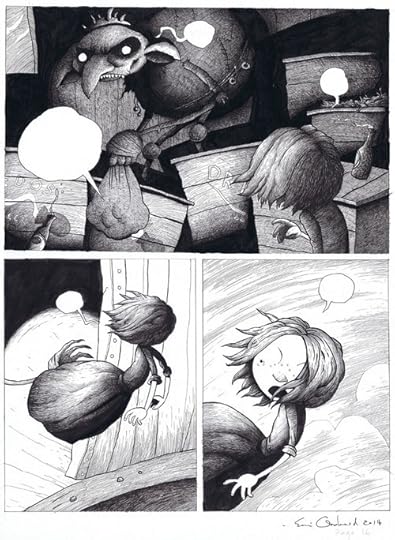
Look at all those lovely empty speech bubbles. What's happening? The thing! The lumpy bag! A fall! The shadows, so many shadows. I always gravitate to shadows, in drawings. They lend depth, of course.
I always felt like anyone else who would work with me on future stories faced awfully big shoes, imaginatively speaking, after Sydney's striped socks and impromptu robots. When chapter sketches came in for The Dread Crew and Flight Of The Griffons, I melted into a blubbery mess. I was seeing the faces of a host of kindly pirates who had been using me to channel their world for years! Right there, looking up at me and smiling, all tattered and dripping with grease and diesel fumes! There they were. It was magic.
Thankfully, it would seem, illustrators have a dizzying array of stripes, robots, and obligingly large feet. My first picture book, If I Were A Zombie, is monster and magical-creature poetry for 4-8 year olds. It's well into production with Nimbus, and will hit shelves this coming fall, and so...
I am so thrilled to share the terrifically gloomy and romantic and shiny wonder-eyed news that the excellent Eric Orchard is illustrating the book! Right now! And I'm crying again as he sends sketches through—although this time, it's more cry-giggling. Breakdancing zombies will do that.
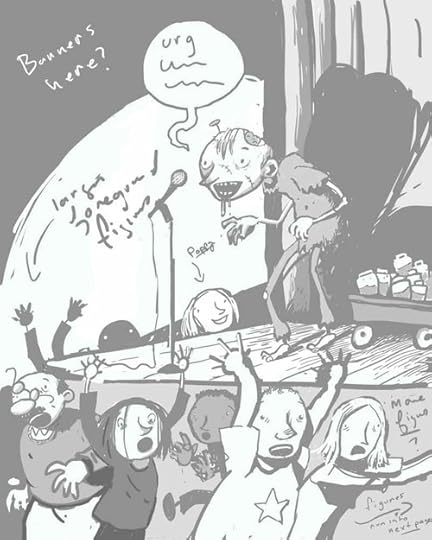
I've been growling and snarling these poems to kids for a couple of years now, from a clutched bundle of loose paper, and lately I've been showing them sneak peeks of Eric's sketches, too. I tell them it's secret. I tell them that if he were here, he'd run up to the screen and shout NOOOO! THESE ARE SKETCHES! I AM NOT DONE YET! DON'T LOOK! and I mime panic, and the kids laugh and laugh. Ha ha! Drool!
And so I'll say it here too. It's already amazing and funny and sweet and full of muddy grossness and delight, but we've still got a ways to go. Look where Eric will take them—all of them—the talent show-winning zombies, pearl-spittin' mermaids, room-messing goblins, sea-wading giants, photo-bombing sea monsters, water-skiing vampires, and not-remotely-glittery, proper wood fairies. Look where we will be!

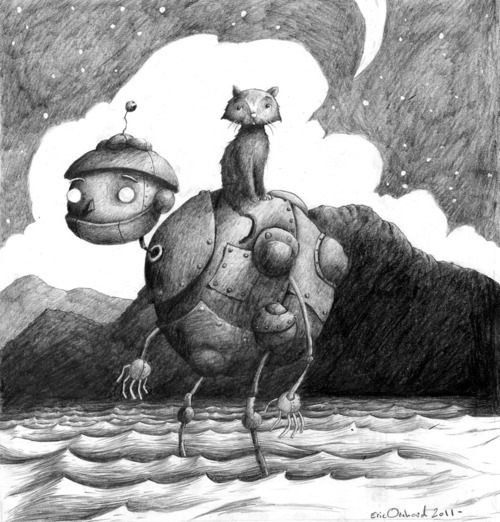
Since the book is a back-and-forth exercise in imaginative oneupmanship between Evan and his friend Poppy, I had sent Eric the two kids for visual cues. He gets it right away, though, what it is to make cool stuff with one hand and mitigate the running-around of muddy/delightful little creatures with the other.
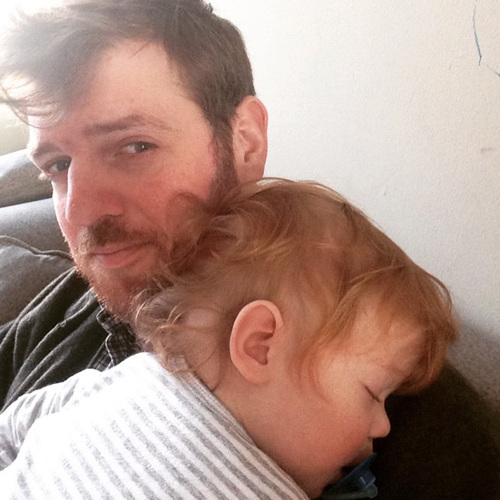
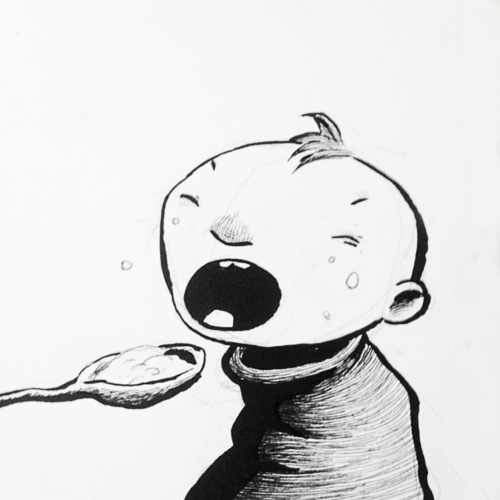
[image error]
"Maddy Kettle... looks fantastic: every panel exudes quirky, gorgeous atmosphere." —NPR
In the next while, I'll share a few sketches here and there. He is too, after all—from my book, his own stuff, and all kinds of other terrific stories in the works. It's so fun to peek into an artist's studio. Highly recommended.
In the meantime, pick up Maddy Kettle: The Adventure of the Thimblewitch, Eric's first graphic novel for young readers. It was thoroughly devoured in this house, as I hope the zombies will be too—maybe in yours.
More to come! Hold yer nose.
December 12, 2014
Sheree Fitch cheers for pirates
"When a world is this richly imagined, characters this juicy, language this gobsmackingly fresh and surprising in a tale so riveting and yet complex—well, look out. Kate Inglis' writing is exquisite—never ordinary—and this book has that IT factor, a combination of magic and mystery and lushness. Inglis has taken the pulse of the planet and birthed this environmental adventure full of action and activism just as cli-fi (climate fiction) becomes the new genre.
Never didactic but wisely intentional, it is just a matter of time before The Flight of the Griffons takes off and lands in classrooms and homes everywhere. Missy Bullseye oughta rub shoulders with Harry Potter on the world stage. This is not hyperbole.
Hunker down. Read this BRILLIANT book. It is one of those rare ones. Watch for the work of Kate Inglis and watch for Missy Bullseye... rising, and along with those Griffons, taking flight."
— Author Sheree Fitch

In celebration of reviews that make me happy, I'm sharing bits and pieces of Sydney's illustrations from the book, and I just realized that I follow Sheree Fitch saying "The Griffons take flight!" with a picture of the Griffons crashing. Ha! Ha ha whee! But hey. It's not the flight that matters most. It's the recovery. It's a pivotal human theme. At some point, you go down and you hit hard. Then you fly again, and that's when the flight feels most righteously excellent.
Besides. This is one of my favourites. Finola, master pilot, is about to deliberately stall the Avenger's engine in mid-air. Cirrus, machinist from Alberta's Blood Tribe, hangs onto some storage netting, as he has before. Rolf, on the left, the near-silent coxswain, will carry a bashed-up Missy to safety at Fort Walsh. And there's Gwynne, genius aerologist who figured out how to make jet fuel out of vegetable oil. And Missy. She can't hear, but she can feel the ship screaming.
The flying comes after this just as much as before. Maybe even more.
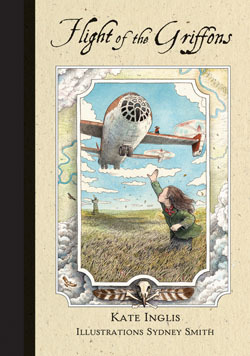
It's the holidays. Buy books! Get your copy of Flight of the Griffons for any kid or adult from about 11 years old and up at the following retailers and distributors:
Woozles, Canada's oldest independent childrens' bookstore (they'll ship anywhere)Amazon Canada or Amazon USChapters/IndigoStraight from the Nimbus Publishing warehouse (they've got signed and stamped copies—make sure you indicate that you want one—and they'll also ship anywhere)December 10, 2014
taking face and giving it

I've been wanting to share the lazy, lovely day I had with singer-songwriter Kim Harris for ages. We poked our way through the woods across the creek on one of the fall's last golden days, bringing with us a bag of Billie Holiday and soft things and sparkly things and we played while the last leaves drifted to the ground. Here, she's wearing a bit of 1940s fur that belonged to my grandmother, a prize curled up in an ancient hatbox I rummaged while looking for props in my parents' house.
Kim sang at this year's shed workshop along with Tara Thorne and Grassmarket. Her voice is as much silk as grit and caramel. And so to shoot her in the same light a few weeks later— with the stage bulb that had lit that night still fixed onto the tree that overhangs my house—made me feel wildly lucky. To know people who make music! Who have voices that sing songs and play at the same time! It's a miracle to me. I watch them with my jaw hanging open. And here they are, in my yard.
+++
I went to New Brunswick the other day to work with photographer Denis Duquette, and to confirm that it's as human to look through the lens baffled at the palpable nerves of every subject (really, everyone) as it is to be the subject and be clenching. He'll share his own recap of that day soon, and it's got me prickling all over.
As a photographer, you see beauty in everyone, and that is the truth. As the subject, you're sure your face looks as relaxed as the butt pucker of a hairless cat in a bath. Because damn. It's hard to look into glass, even when you are determined to not mind whatever you end up seeing. We'd all like to be bigger than ourselves like that.
In Denis' studio I used the words 'face like a butt pucker of a cat'. He used the words 'knuckle sandwich'. He knows as well as I do that every human being insists they're not photogenic, and every photographer smiles. I should know better by now, right? But it's hard to let someone else do it. Even when the person on the shutter is famed for his ability to put others at ease.
Look up, he says. To the left a touch. Now to the — STOP. Don't move.
I've said that before. I said it to Kim when I found little jewels in her eyes. The ones that I know are so much of her. It's a funny business, switching sides. One serves the other, I hope.

November 24, 2014
nothing's too good for my baby: the CM magazine review

You try, for the most part, to not worry about people enjoying the company of your children. It's certainly enough to worry about just presenting them safely—fed, watered, dressed, cleaned, rested. Going further—is the world going to be kind?—will make you crazy. Because you can't control the world. You can only put the woodstove on, get the marble run out, and make a nice supper.
This is books. It's such an unfathomable labour to get a story shelf-ready, and then, they say, you've got to let go or you'll drive yourself bananas. All you can do is release it, and then turn back to the shed for whatever labour is next.
But every now and then, your publicist sends you an email in all-caps and you remember that you've forgotten how much it matters, how much you care. And how much, even though you try to be cool, having a book out in the world is one heckuva knuckle-biter.
It's almost Christmas, and you should buy books. Not just mine. Every year I go to Woozles and spend half a mortgage payment. You can't go wrong with books. Buy Maddy Kettle. Buy Mabel Murple. Buy Wereduck. Buy the young readers' edition of I Am Malala. Buy basically anything from this guy, even though he hardly needs you to. And there are so many more! There should be a stack under your tree. You should not be able to lift it without a little wagon. Kobo schmobo. When you're shopping, make sure you spend an afternoon drifting through shelves.
THAT SAID. IF YOU LIKE PIRATES AND/OR ADVENTURE AND/OR WORRY ABOUT PIPELINES. Flight of the Griffons is at Woozles, at Chapters, on Amazon. Even straight from Nimbus, the publisher—and all of those outlets ship to the States. The book is YA, which means it's perfect for 12 years old and up (10+ if you've got one of those voracious types), 'up' including adults just as much as kids. If you want to be proper and start with book one (available from all the same places), go right ahead, but plenty of folks have jumped in with book two and been just fine.
To the point, look! Jump past Missy, fresh on-board with the Griffons after spending days on the prairie, watching the sky. It's an excellent review from the super-credible amazing CM Magazine, and it made me feel a million of all the best things. Because as heart-busting as it is to admit it, it matters. It matters so, so much that the world likes your baby. Especially a corner of the world that really, really *knows babies*.
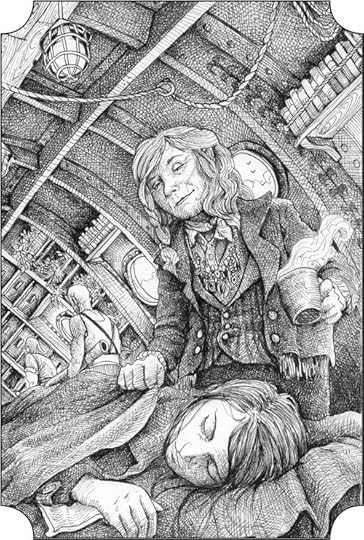

"Flight of the Griffons is much more than an adventure story ... the character of Missy and her fellow pirates gives readers faith in the tenacity and goodness of human nature.
If you like technical detail and invention, you will like this book. If you enjoy books about human interaction, this is the book for you. If you like to see men and women going about their lives with no boundaries as to roles, this book is great. If you love the vastness and variation of the Canadian landscape captured in short sharp brush-strokes, don’t miss this book!
The writing style is taut, crisp and, in places, overpoweringly beautiful. Inglis is able to convey words of wisdom and deep emotion at the same time as she is able to move the story along at a good pace.
Flight of the Griffons could be read as a stand-alone, but to have read the first one in the series would make it even more satisfying! So buy both volumes!!" —CM Magazine
November 20, 2014
pocketful of buddha
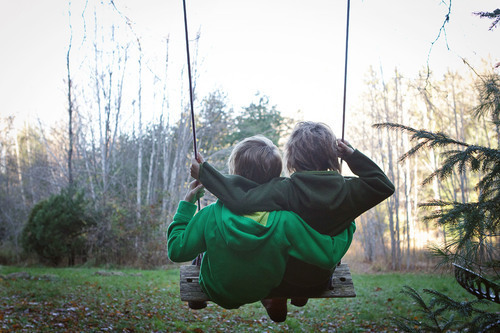
We went for pappadums and chutney and samosas. We ate in the parking lot of a closed Frenchy's and talked with our mouths full about Charlie Chaplin, Lancaster Bombers, the overcooked brussels sprouts of the Royal Air Force, and swing dancing. We drove fast to get to Windhorse Farm for the last of the day's sun because it's the most peaceful place I know, and because their great-grandfather never visited a cenotaph. The war was a goddamned bloody mess that never should have happened. Four tours of duty and planeload after planeload of boys, his friends, blown out of the sky. It made him angry, not proud.
On Remembrance Day, Grampa went quiet. He would sit in his study, eat on his lap, and not say much. I thought we'd do the same.
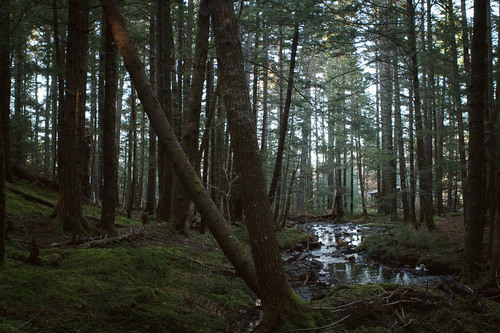
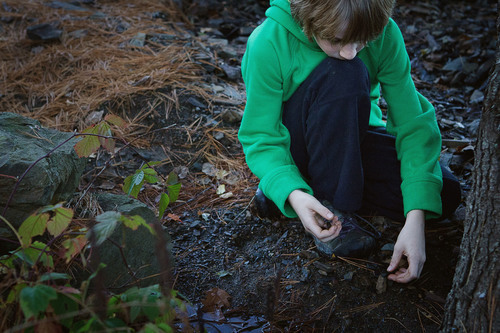


These are Buddhist woods. Everywhere you turn, there are small spaces and markings to find for the contemplation of a story that's bigger than yours. It's magic, to be simple about it. We leave inukshuks. We are here too.
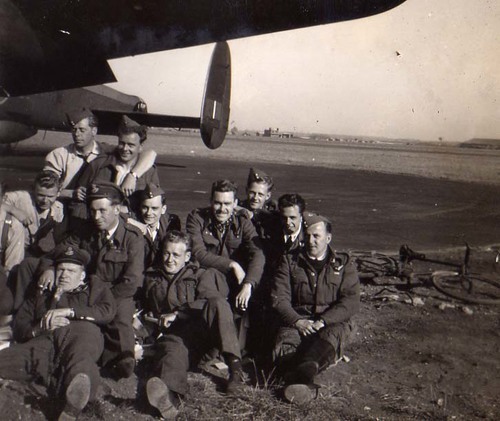
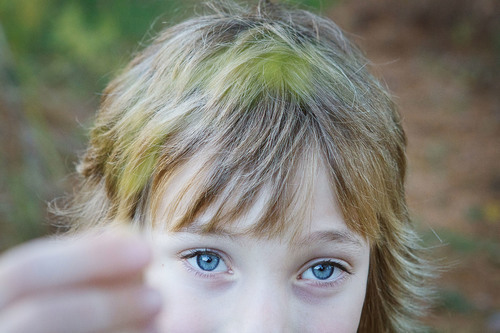
What is this bit of fluff from?
Asparagus, baby love.
It's so pretty. I will hold it up and you can take a picture.
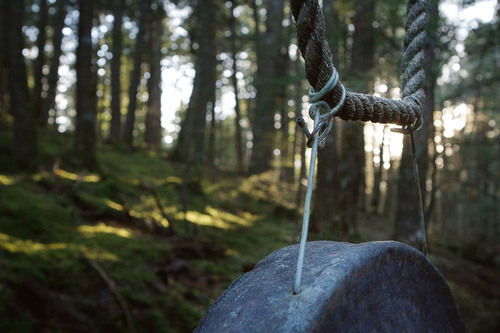
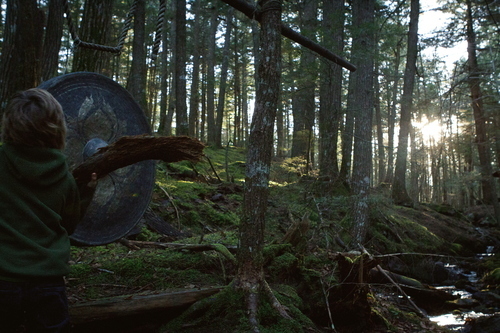
Nothing's more glorious than an unexpected gong. It's been waiting for you to come along. It sends a shockwave of vibration up your arm and up every trunk. It makes fairies pop up like prairie dogs.
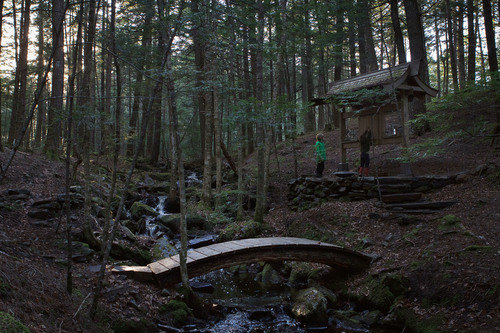
Bald eagles circle this lake. We find an explosion of white chicken feathers, the remnants of somebody's supper. We find paddles and rocks and rakes and leaves.
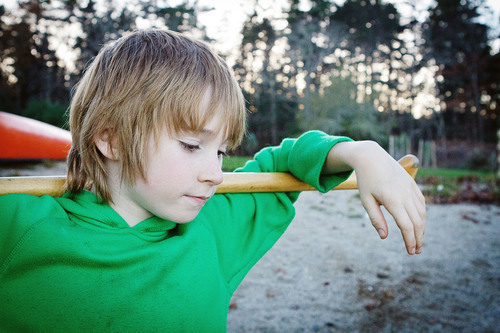
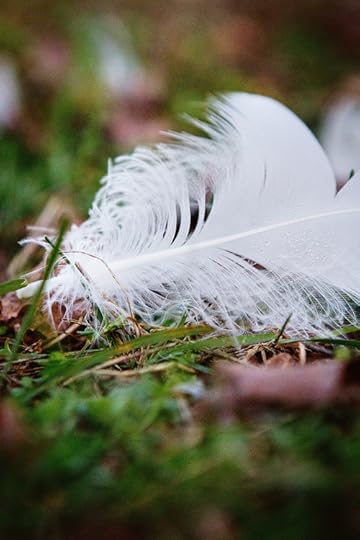
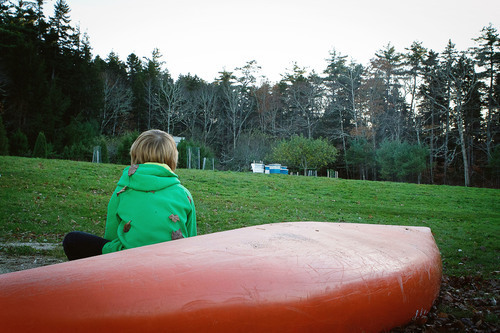
A long time ago, I had bought a little Buddha for Ben because Ben likes little figures, little curiosities, little anythings. He dug him out of the glove compartment.
Tell me again, what is he doing?
He is meditating.
I will bring him with me to the farm. I will show him everything. He will like it there.
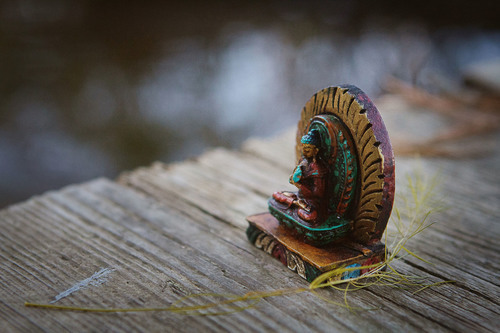
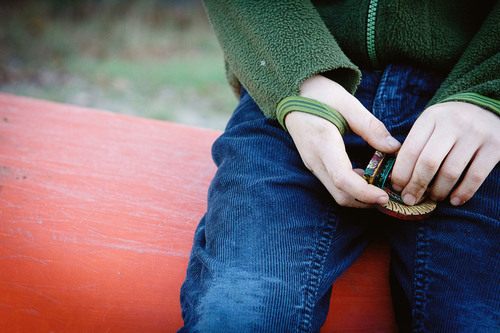
Look mom. I am breathing.
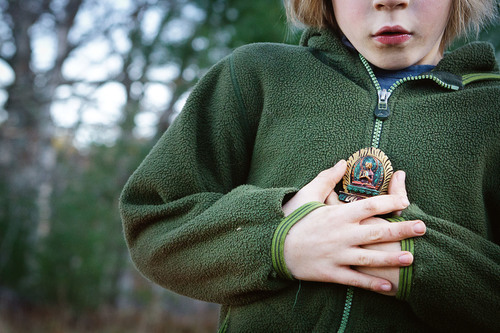
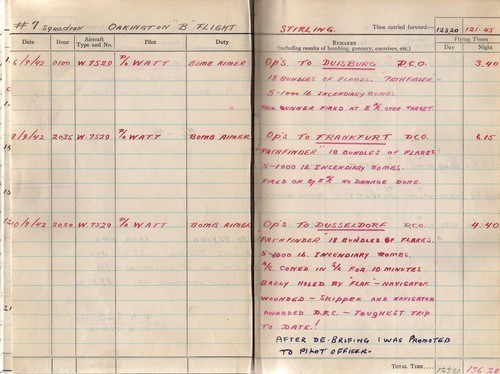
The chickens were beside themselves, shrieking and pecking for space in the rafters of a shed.
They won't go in the coop anymore at all, Margaret told us. On Halloween, of all nights, a weasel got in and got ten of them one-by-one in the necks. Sucking their blood! The poor things. They're still terrified. We tore the old coop down and built a new one, but they aren't buying it. I wish I could speak chicken. I wish I could tell them we've made it good and tight.
What a privilege to fret for chickens. It's got to be some kind of reverse canary and coal mine. If you're fretting for chickens, generally speaking, you are living in peace.
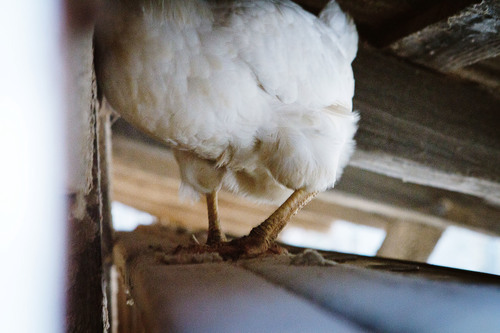
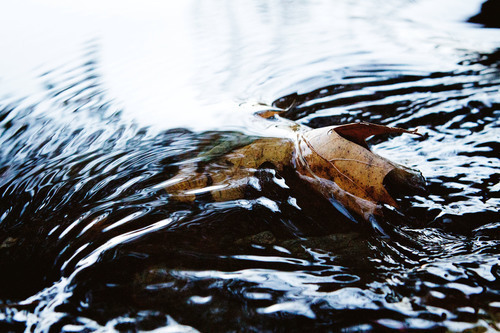
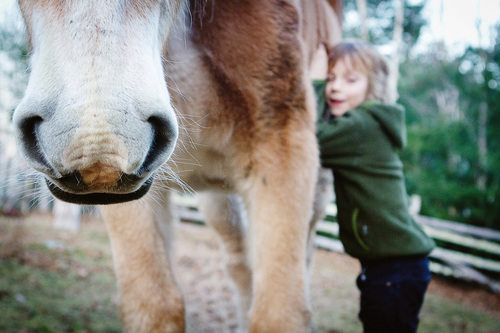
We made our own church, memorial, parade, and escape from the bloody goddamned mess of the news. We walked every corner of those woods, finding treasures and leaving treasures and talking and talking and talking. I thought about how exhausting it must be to have no purpose other than destruction; 13 year-olds given automatic weapons and forced to shoot journalists; the profoundly unfair luxury of stepping back for safety's sake only when aggressively nudged for apples. I thought about specks. I thought about imbalance and marginalization, and about how nothing will really resolve until that ends. Not until everyone gets a fair crack at worrying about the well-being of chickens.

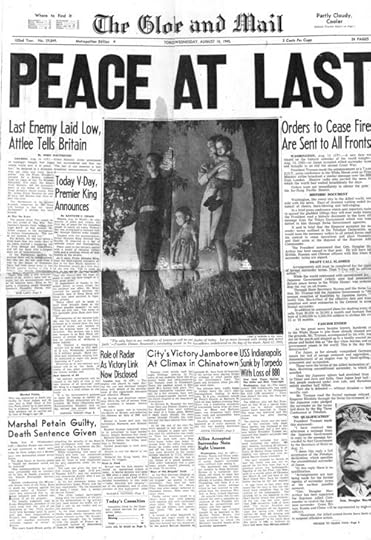
November 5, 2014
the magic word
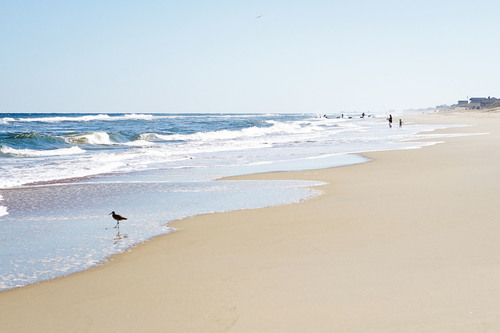
North Carolina is The South. North Carolina is shrimp an' grits, biscuit an' grits, scramble an' grits. This place is foreign to me in that way that America always is, in ways that I can't wrap words around. I love how it's wholly un-Canadian: in the trees, the undertow, the drawl. In the constant scuttling of translucent ghost crabs and the way sport fishermen launch themselves into the waves like discus-throwers. There is no beach burr like an Outer Banks beach burr. Neither the ocean nor the wind ever seem to inhale. Both roar unendingly.
Women come to the Serendipity retreat from all over, from Californian ranches to the Texan panhandle. They bring everything with them. They bring duffel bags full of failed businesses and startup ideas and grieved husbands and sons and daughters and love affairs and crippling doubts and Vargas girls. They bring journals and paint and everybody eats too much.
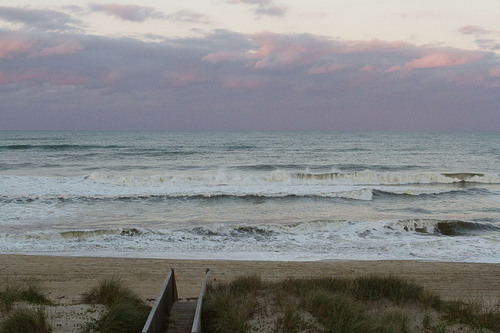
I go there to work, though nobody back at home thinks it's work. They tease and put the word in air-quotes. They see this beach and they figure it's all bikinis and grits. Which it is, and it sure beats a cubicle, but when you're a teacher, you can never switch off. You give and give and give. You are a steward, along with the other beautiful teachers and staff, of something bigger than you.
When I first arrived, I went under the pier for some tests, prepping for a prompt in my self-portraiture class. I was already so tired, so beat. I had landed there feeling not capable of giving and giving and giving. I couldn't cast the kind of light that I was supposed to teach. I glared at my own camera and sighed a lot. I gave up and went for grits. I figured I'd pretend my way through those next few days. Sometimes that's just how it is.
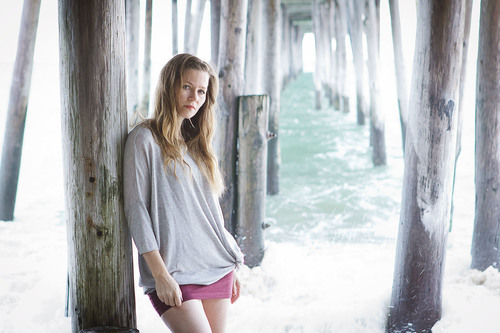

That night I fumbled my way to the waterline in the pitch black, wondering if I'd find a coyote to sit with again. They stayed away but I kept wishing, looking one way and another in the hopes that a silhouette might creep up beside me in the dark.
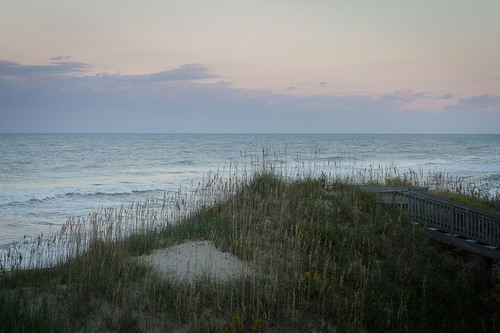
When everyone arrives you have to switch on, and I did. One day-long photography class, one day-long writing class. Scrambling the night before to go through everything again, to check and re-check my gear, the prompts, the lecture. To consider who was assigned to be in my care and speculate as to what they might need from me.
Among all that, I did a 22-session portraiture shoot on the beach in a matter of three or four hours. It was dizzying, and with no time to warm up or mess around. Plus there's a peanut gallery, because everyone else is lolling and writing and looking for shells, and they like watching what's going on. It was a speed-dating blitz, and it was my job to advance from a handshake to genuine flirting in a matter of minutes. It's not easy to coax one subject—let alone 22 of them, one after the other—past the nerves and the shock of big glass trained on her face, and to draw out what makes her *her*.
I know how hard this is, I'd say, looking right at her. This is really soul-exposing. And listen, you're not the first person to say that you aren't photogenic. Everybody says that. Here's what I want you to do. Just listen to me now and do this with your shoulder, that with your expression, stay fluid back and forth on your feet, breathe. Always breathe.
(I lift the camera to my eye.)
The most important thing you can know right at this moment is that this kind of vulnerability is profoundly life-changing. Here is why, and it's the best thing ever:
Testicles.





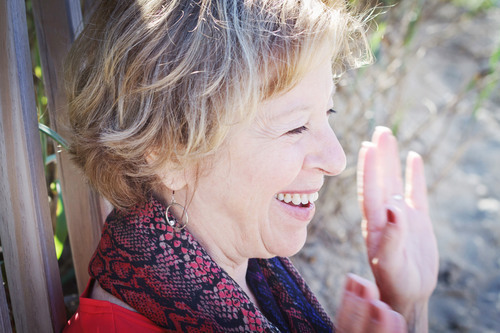




Pushing to work—not being still, not at all—is my meditation.
Every night I walked back across the street to our little cottage and collapsed in every possible way. Arabella and Hannah and I would pour wine and sit on the couch all tucked in with bourbon-soaked cherries and we'd talk and talk, spanning everything. I love these girls.

When I'm in North Carolina with these women, these artists, I see everyone else in the most perfect light—a light that I don't always feel on my own back.
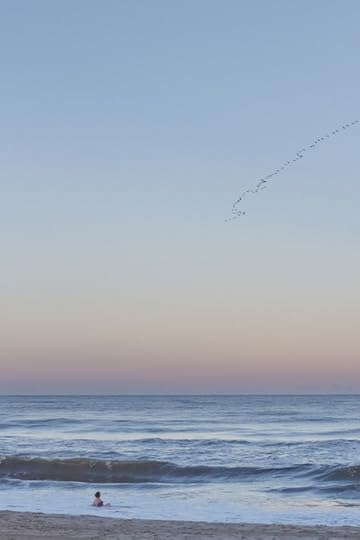
Which is why there's such a thing as bourbon-soaked cherries.
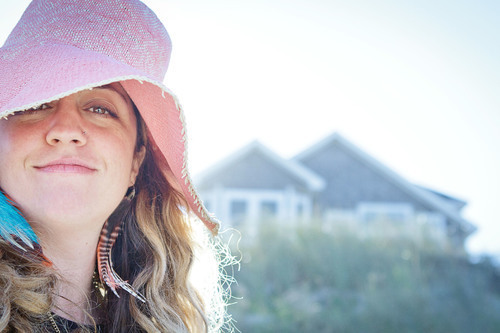
October 30, 2014
a witch and a ghoul ninja in the woods, giggling
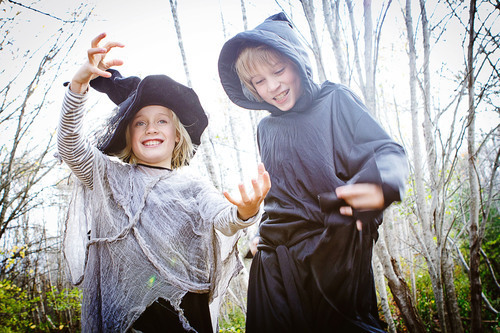
The first production meeting with Nimbus was coming up. Art direction: my chance to pass on ideas, particulars, or peculiars before the illustrator (I can't wait to tell you who it is) starts sketching.
If I Were A Zombie will be on shelves by this time next year—a book of monster poetry for 4-8 year olds. It's Evan and his longtime best-best Poppy imagining the skate park as a robot, math tests as a vampire, bedroom-tidying as a goblin, and the real muddy truth about fairies and crows. And it goes on like that and it's very, very silly and whenever I read them to kids (I've been carrying smashed-up printouts for ages), I lose my voice with all the growling and snarling and goofing. I can't wait for it to be real. I'm so excited.
First order of business for that meeting was evidence. Visual cues. They're real-life monsters, after all, ordered one-by-one in a very serious list.
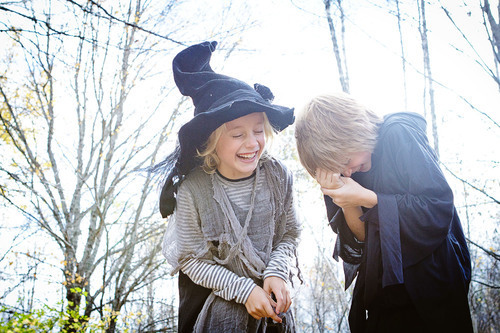
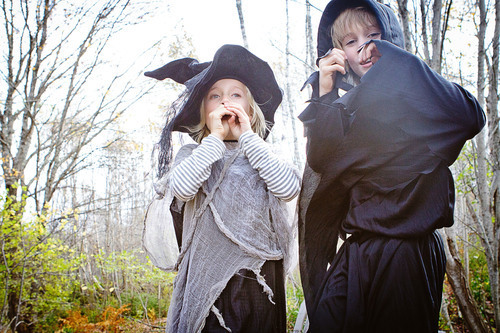
Um, excuse me. Can you write something about a clown who looks like this.
(Yes, love. This is next.)
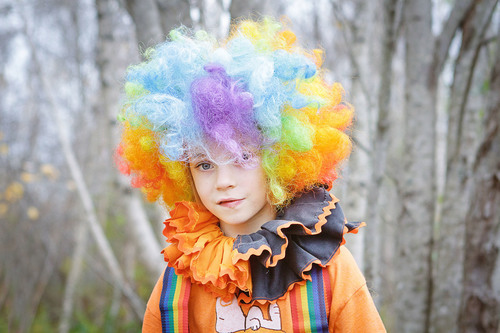
Hey Poppy. Show me what it looks like when you're standing next to your cauldron and you are about to cast a spell on me.
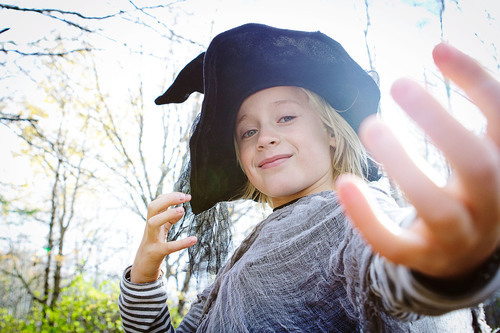
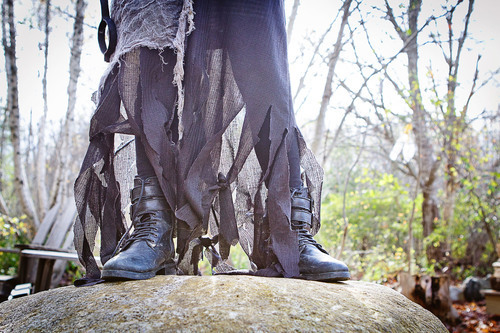
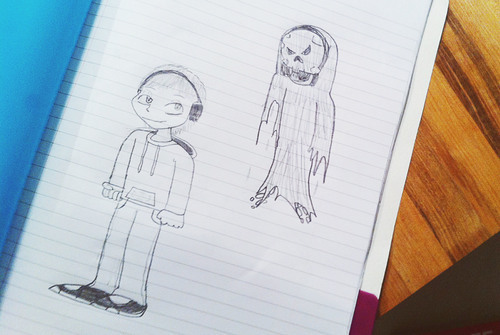
Evan, self-portrait, thinking of Halloween.
These two, since they were two. Her mom and me sitting with mugs of tea and glasses of wine, thumbing through cookbooks. We didn't finish more than three sentences in one stretch for a good five years or more. Someone was always, suddenly, too high up in a tree.

I envy kids. Nothing is a lost cause, for a kid. Not really. They might wish they could be bigger, you know? But that's all. When we're kids, we figure that bigness will eventually make us heard, seen, strong, or unafraid. We figure that will come as we grow. It's our entitlement. Maybe that's why we harden up the way we do when we're adults. We're as big as we're going to get, but we're still small in the same small ways. There's only so much you can affect.
Which is why there are hi-chews, peppermint bubble baths, jammy Sundays, comic book shops, Sharpie marker multi-packs, stuffie Totoros, origami R2-D2s, people to tuck us in. Stuff that makes smallness better. Like tickle trunks.
Everyone should have one. Do you?
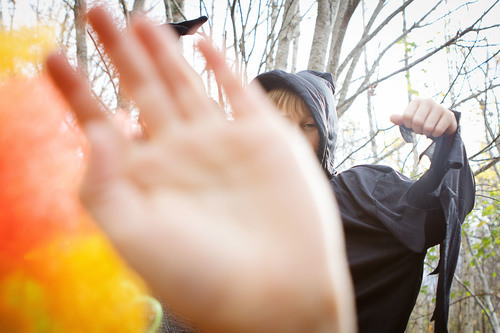
October 15, 2014
the dutch in old amsterdam do it
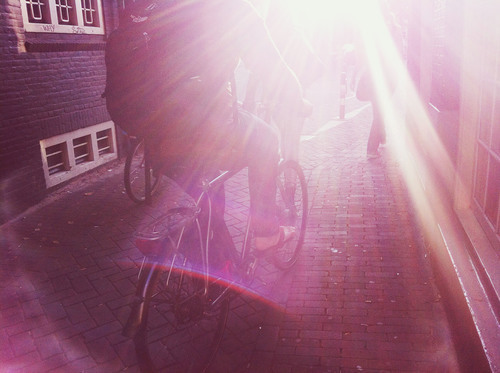
The day before flying to Europe, I was trying frantically to finish stacking two and a half cords of firewood—not a lot by south shore standards, but several days of hard hauling when you're on your own. One stack tucked in in the lee of the shed, another along the outer edge, and the last small bit wrapping around the front. I was bruised and bashed and for days, every time I woke up, I couldn't move until I wiggled every joint like a tin man low on oil.
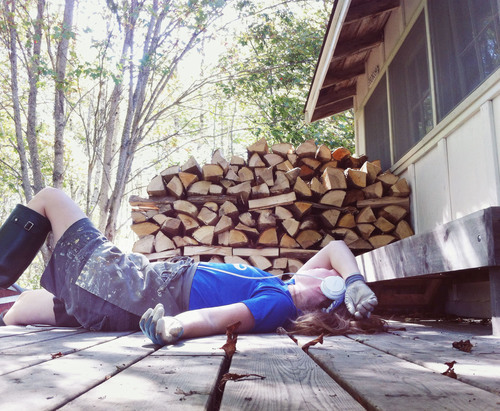
Then I got on a plane and flew across the Atlantic, and got onto a train, and emerged into the sun again in front of Amsterdam's Centraal Station. My GPS pointed at my hotel as being 'across the street', a high-speed cobblestone dodgeball game of hopping from one concrete island to the next across a dozen every-which-way lanes of bikes, Vespas, little cars, big cars, delivery trucks, streetcars, buses, and canals. It took me fifteen minutes to get from one side to the other. It was Richard Scarry’s Busytown. An 800-year-old Busytown. And I was Lowly Worm dragging a suitcase.
Was that me just the day before, sweating in the woods by the creek?
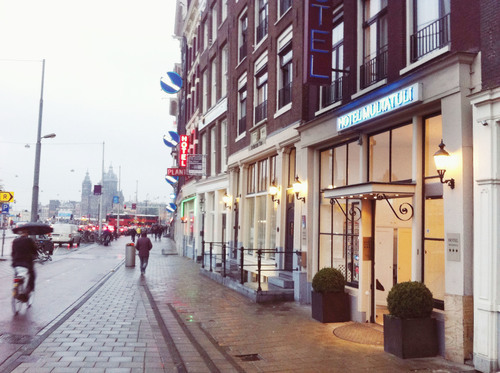
I stayed in the attic. It was up some stairs, then through three doors. Then up two more flights of stairs. Then two more doors. Then up two floors in a 2-person lift. Then three more doors, and one more steep set of winding stairs to the end of the hall. It was the littlest hotel room I've ever seen, with giant beams and rafters within inches of my head. The windows opened all the way, swinging out over a courtyard several stories below, with no screen, no stopper. I left them open all day and all night long.
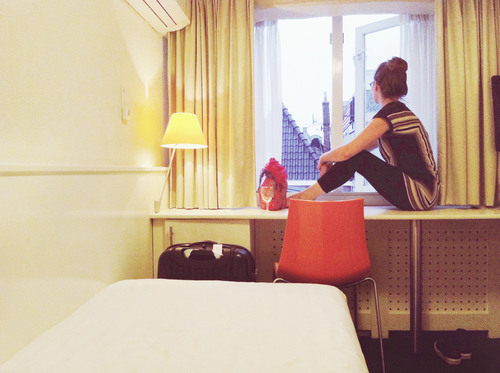
The window framed thousands of terracotta shingles in a maze of steep-slanted roofs and cathedral domes with glass toppers and widows’ walks. James Bond chasing henchmen. That sort of thing. The church bells started playing sometime after dark, and they'd go intermittently all night. Not just dong-dong-dong, to announce the time, but songs. I’d drift in and out of sleep, a bit mixed up with time. I’d wake up at 4 AM like I’d just had a nap, the pigeons cooing outside my window, and the churchbells, and I’d drift off again.
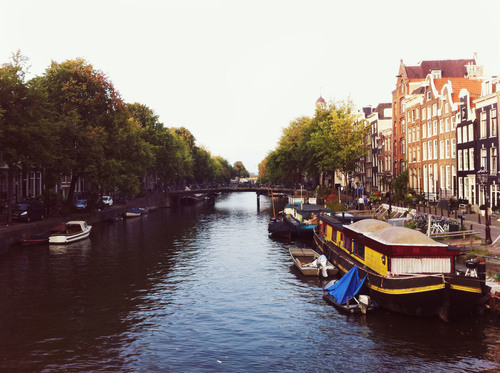
Landing in Amsterdam was landing inside an infinite diorama, yet with real roses on vines, and the indecipherable, en masse murmur of another language all around. It was the first time I was an outsider. It was the first time I wasn't sure how to move without being in someone's way, or without looking like someone who doesn't belong. It unfolded around me like a giant pop-up book, like magic.
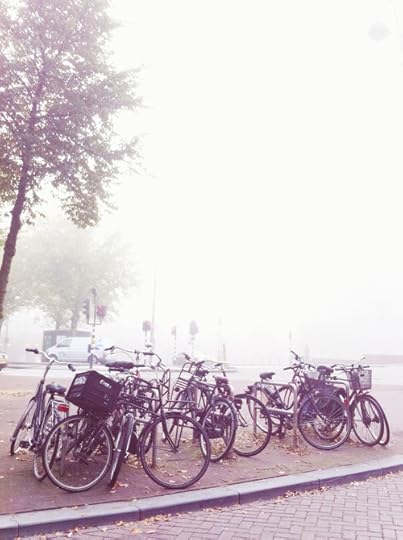
THE DUTCH. THEIR BIKES. This is what everyone at home had said, rubbing their hands together when I told them where I was going. Ahhhhh! You will love it so much. I loved it so much! You will love it so much.
From five minutes in I was in a daze, a philosophical state of shock. Why does one place develop one way, and another doesn’t? Where do our values come from? Who dictates our sense of aesthetics, our philosophy of development and human health and quality of life? Since the 1950s, North American infrastructures and habits have been manipulated to sell as many cars as possible. We are the lost souls in WALL-E, sipping from drive-thru big gulps.
As a whole—perhaps not as individuals, which is an interesting discord—western culture rejects personal thrift and minimalism and humility. We feel entitled to what we think is decadence, but it's a trick. Our definition of decadence was designed not by us or for us, but by and for corporations.
This is what the opposite looks like.
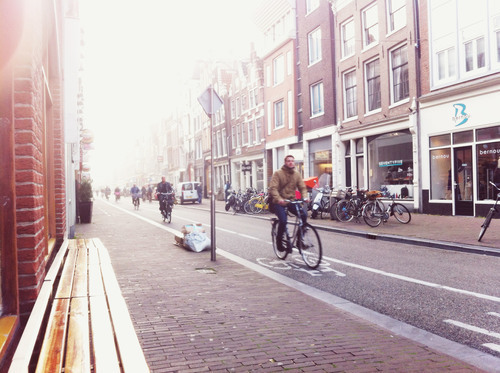
I sat there for a long time that morning with an oven-warm croissant and hot milk with a drizzle of honey, daydreaming while the most immaculate, most romantic wind-up moving picture box rolled infinitely in front of my eyes. There is no world that's better to watch go by than the world in Amsterdam. Parents bring little ones to school, whole families on two wheels. These are the luckiest kids in the world.
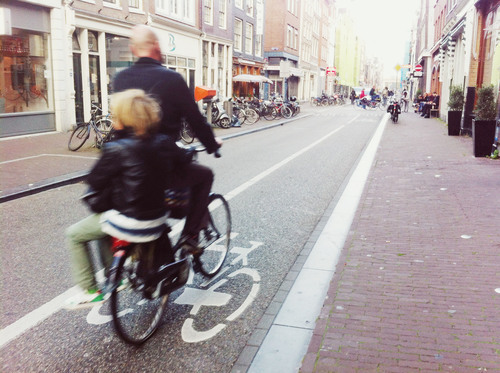
In Amsterdam, everyone gets everywhere “in twenty minutes". If they tried any other way, it would be an hour. Do I have a bike? Of course I have a bike. A neverending stream of them go every which way in an highly organized system that has language and flow. Bells trill constantly, keeping peripheral visions alert for pedestrians and cyclists alike.
In six days, I didn’t hear a single shout or horn. Cyclists swing within inches of front and back tires. Some are hell-bent, others are pokey. But there’s hardly a single objection, ever, except for a gentle “Oop!” or what I imagine to be a “Sorry!” in Dutch, upon a close call, or a greeting from one cyclist to another. Hallo! thrown over a shoulder, with a wave that waggled back and forth until they vanished down the street.
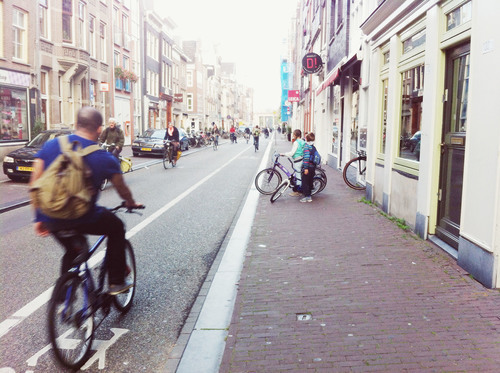
They moved too fast. I froze them all in my mind, willing them to stay. A girl of 5 or 6, with white-blond mermaid hair swirling in slow-motion around her face as she perched on a crossbar. Her eyes were closed, her mouth a soft o as she whistled. Her father pedaled.
A man in a tweed jacket rode casually, if there’s such a way, down Harlemmerstraat with his arms folded across his chest like he was in an easy chair. A little girl, maybe two years old, with brown skin and blond cockscrews sitting in a handlebar seat with her hands folded in her lap, blinking in the mist. A lady, cycling and humming. A little boy in a wagon, humming.
One of two expressions, always: either a rosy smile, or a rosy contented blankness. They are all burnished, somehow, in that Dutch way. They are good stock, tall and substantial and sensible, with fortitude. We are Calvinists, they say. We used to be quite dour. Now we are just blunt. They smile. Ahh, this is us! This is the Dutch. It is just our way.
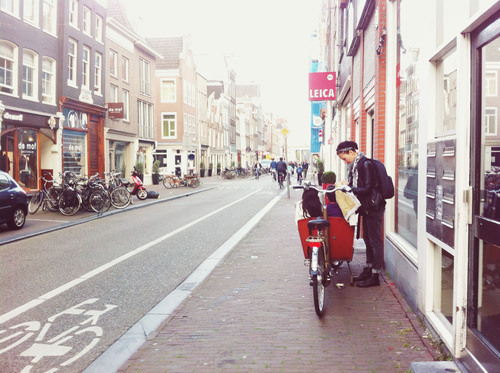
I walked three or six or seven hours a day before and after work, with no destination in mind, through an interconnected corn maze of circles and bridges and lanes so narrow that facades on one side and the other lean in to touch foreheads.
People told me to go to the Rijksmuseum, to see the Vermeers and the Rembrandts; the film museum; the photography museum; Anne Frank House. They said You'll need at least a day there, and you won't even see a quarter of it... and You'll need to stand in line, everyone wants to see where she hid... and There's this place and that place... not enough time... and the days slipped by.
All I wanted was the whirr, the fog in the mornings, cafes and bakeries, corner shops for a bottle of wine and cheese and dark chocolate. I walked the canals, peeking through open doors to stairs like ladders and through four-hundred year old glass. I fell hard into an insatiable love with this city. If I went inside, into any building, I wouldn't be out in it anymore, you know? So I didn't.
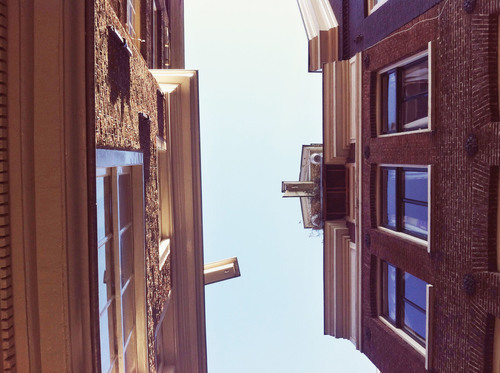
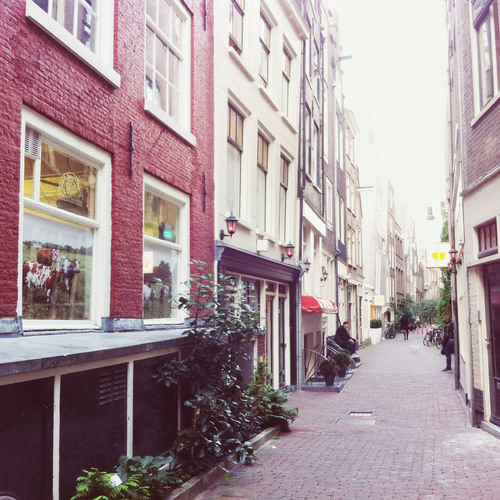

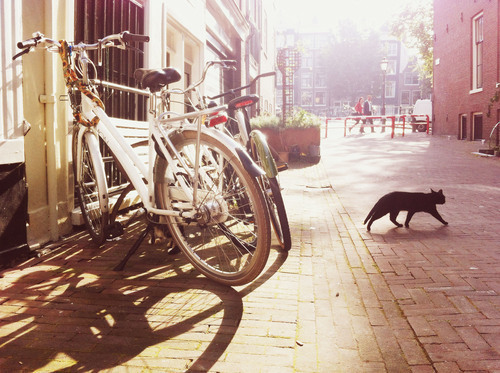
I followed that little black cat to yet another vintage shop, this one with a treasure chest full of vintage corsets and silks. I bought a satin slip from the 1930s, a long, deep-backed, lacy rose bit of deliciousness that was waiting for me.
Outside of work, I was so happy on my own—finding a little Peruvian restaurant and ordering a glass of wine, gazing out the window at the canalboats going by. Walking and walking, carrying a little delicious bag, not speaking. I'm sure I smiled for six days straight. But it was the vintage shops that made me a little lonely. If I had have been there with you, we would have squealed and sighed. There was so much to touch, so much to gasp at and play with. By myself, I had to keep it all in, though I'm sure I didn't. I dragged my fingertips over old fur stoles and cashmere and tiny buttons and muttered and whispered at it all, smiling, smiling.

Somehow, all the vintage shops have agreed to an unspoken rule of colour. Each one—many specializing in party dresses, lingerie, hats, boots—was organized like a dressing room, with rows and rows laid out by colour, not by sort. So you enter and it's a rainbow, soft pinks drifting into dark pinks drifting into soft purples and like that. Tulle and satin and weathered denim, and basements with a tasselled rope to drop down into a pit of crinolines. I've never had so much fun by myself, but I missed you, too. I wished you were there.

I didn't need paintings, you see? I was already in one.

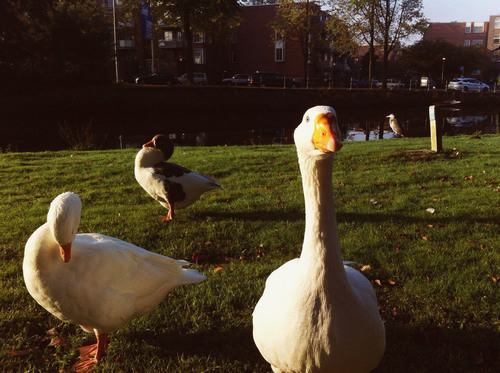
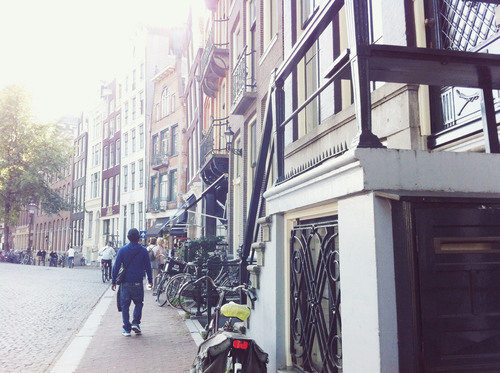
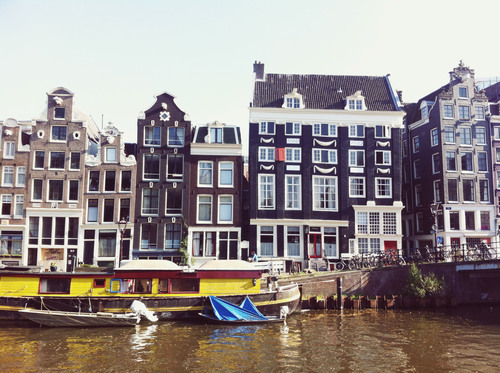
I know there's the phenomenon of travel goggles. I know what novelty does to our sense of everything. But I still swear that everything is better over there. There are no franchises! No vinyl signs, no televisions blaring in bars and restaurants. Food is real food made by a real person. There's no junk. The little pats of butter, the tea, the quiche, the menus. Even the plain old apartment blocks that I wandered through when I lost my wallet. I loved everything I saw.
After I came back I chattered on uncontrollably and a friend said, They're a funny bunch, you know. They lean so far to the left that they almost veer back around to the right again. They're completely intolerant of intolerance. They are libertarians to the point of fanaticism. They won't even entertain anything other than everyone minding their own business and taking care and respecting one another.
Like I said. A dream.
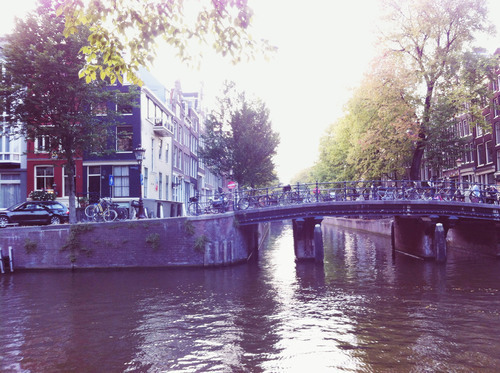

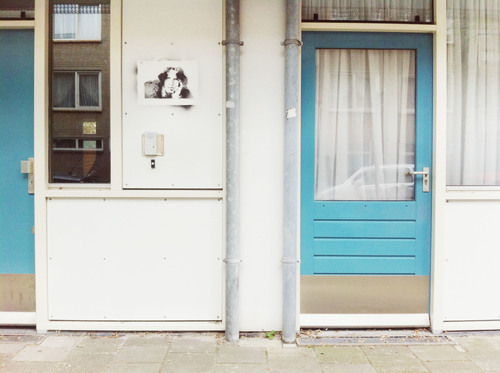
You know, that ZZZZZT city-energy? That growl? I am making a gesture with my hands. Two fists shaking. Shoulders clenched. A grimace. What you see in Toronto, and even, sometimes, in Halifax. The baseline is a frown. Everyone’s pissed. Sick of the traffic, sick of the noise, sick of hurrying and waiting and hurrying. All of it shouts.
It’s not here. Not at all.
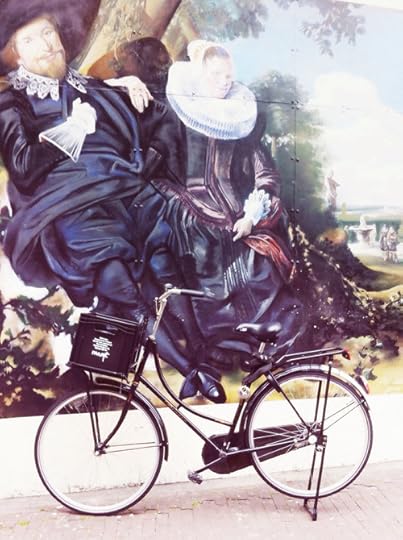
It’s not a matter of scenery or history or architecture. It’s a matter of design. They built their cities to be this way. It’s a choice we assumed we would never have, and so we never made it, and so we have never had it. Is it too late? Are we too wintery? Too hilly? Too sprawled? Too shackled by the legacy of our car-centered infrastructure? Can we institute a mandatory class trip for everyone? Just come and see it. See how it works. You’ll want it too.
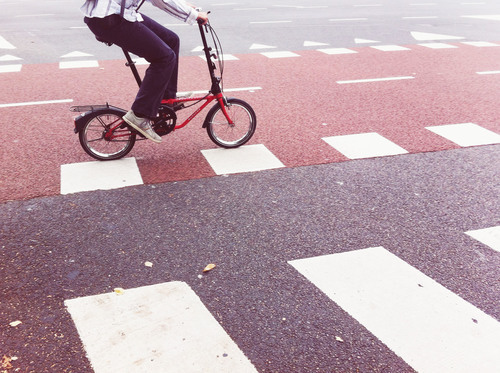
The Dutch are not ‘exercising’. They are simply Getting There In Only Twenty Minutes. They are wearing bright red lips and stacked heels, wide belts, hats, backpacks. And they pedal. Everyone rides at least 40 minutes per day. Not strenuously—not a spin class, and not all geared-up with any sort of sporty flash. It’s broad, cushy seats and low crossbars. They hop on and off. A bike gets folded, sometimes, zip zip, just like that. They simply move, all the time.
I was just as awestruck six mornings later as I was the morning I landed at how Holland's cyclists change the urban as well as the human landscape. Even more than the physical, it's the mental. It’s 40 minutes of spinning meditation, in fresh air, for everyone, young and old. It’s both social and softly quiet. It’s clicking and whirring and the glow of self-sufficiency. It's why they don’t shout.
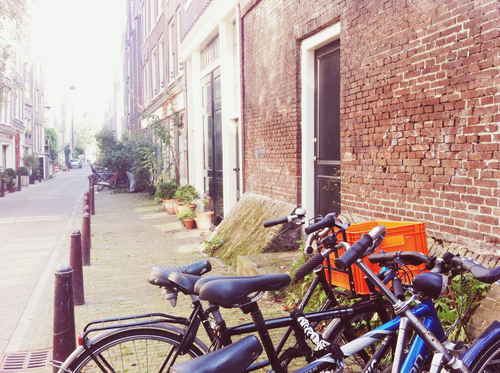
I go on and on, I know. I can't seem to help it. People here who have been there told me that I'd never be the same, and they were right. I wandered for my last hour and took photos like airport hugs. One more, please. One more lane, one more walk. One more moving picture.
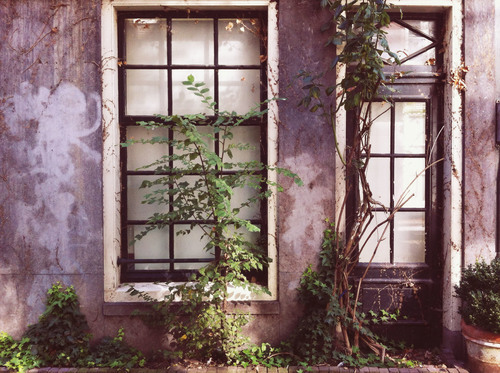
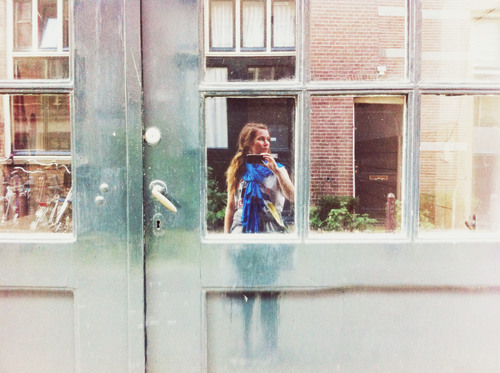
I thought a lot about luck and fortune and autonomy. I wished for three plane tickets and three bikes and Evan and Ben, to show them. I bought a tin of stroopwafels and went back across the street to Centraal Station with a wet face and that rose satin slip tucked into my camera bag. The days would be getting chilly at home. I hadn't quite finished the stacking. My little house in the woods would need battening-down. The fires would start soon, and we would snuggle up with books and sharpie markers, and my dreams would be of pulling into this place rather than away from it.
